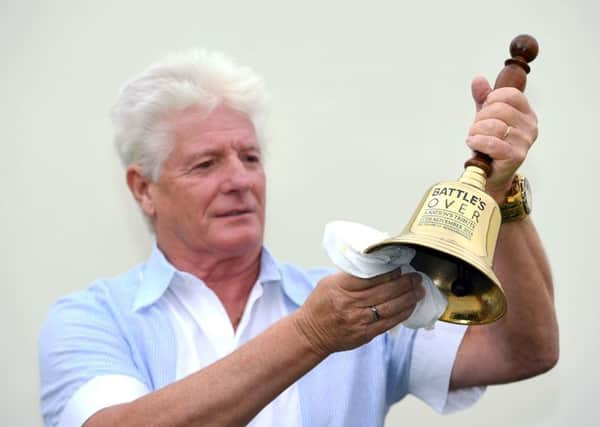Pipers, beacons and bells for global Armistice Day tribute


More than 1,300 pipers around the world will play at the same time before beacons are lit and church bells ring out as a tribute to those who fell in the First World War on the centenary of Armistice Day.
Battle’s Over, described as a nation’s tribute, has been in the planning for four years and will see hundreds of locally-organised events take place on November 11.
Advertisement
Hide AdAdvertisement
Hide AdPageant master Bruno Peek, 67, who is co-ordinating the events, explained that they take their name from the tune traditionally played on pipes by Scottish regiments at the end of a battle, called When The Battle’s Over.
In local time worldwide, starting in New Zealand, pipers will play the tune at 6am, on village greens and in high streets, creating a “swathe of sound across the world”, Mr Peek said.
A lone piper will also play in front of the Tomb Of The Unknown Warrior at Westminster Abbey in London.
Later, at 6.55pm, so as not to interfere with Remembrance Sunday, some 1,000 buglers will play The Last Post at individual First World War beacon sites before the beacons are lit at 7pm to signify the light that came out of the darkness of war.
Advertisement
Hide AdAdvertisement
Hide AdMore than 140 town criers will then undertake A Cry For Peace Around The World at 7.05pm, and more than 1,000 churches will ring their bells as a finale to the day.
“It’s going to pay tribute to the millions who either died or returned home dreadfully wounded during or after the war finished on November 11 1918,” said Mr Peek, a former welder.
“I wanted to put together an international project that was led by the people of the world, not by governments or organisations but real community-based commemorations, because as we know so many soldiers that died came from local communities, small towns and parishes, not just in the UK but other countries around the world.”
Mr Peek said he has worked with town and parish councils and organisations around the world, sending emails from his home in Gorleston-on-Sea near Great Yarmouth, Norfolk, to bring his vision for a tribute to life.
Advertisement
Hide AdAdvertisement
Hide Ad“It’s been a long process, a lot of administration, but I feel so privileged to be working with so many people who want to pay tribute to those who gave so much so that we enjoy the freedom of speech and movement we have today,” he said.
Mr Peek said many of the buglers were cadets, as “we felt it really important to involve young people in these commemorations”.
The cry for peace will be led by a Chelsea Pensioner from the Royal Hospital, Chelsea.
In Ypres in Belgium, where five battles were fought, four town criers will undertake the cry together in the market square in French, German, Dutch and English.
Advertisement
Hide AdAdvertisement
Hide AdA guide of where the Battle’s Over events are happening on November 11, and how to get involved, is available online at www.brunopeek.co.uk.
Mr Peek said he wants to list all who are taking part in the guide, and the closing date to be included is October 25.
ORIGINS OF PIPERS’ TUNE
When The Battle’s Over was a retreat march that told a soldier to return to his company to answer to his name at roll call.
The tune was composed by Pipe Major William Robb of the Argyll and Sutherland Highlanders and it was quickly established in the pipers’ repertoire between the Boer War and the First World War.
Advertisement
Hide AdAdvertisement
Hide AdAndy Stewart, the Scottish singer, wrote lyrics to the tune in 1961. The chorus was: “March no more my soldier laddie; There is peace where there once was war.
“Sleep in peace my soldier laddie; Sleep in peace, now the battle’s over.”